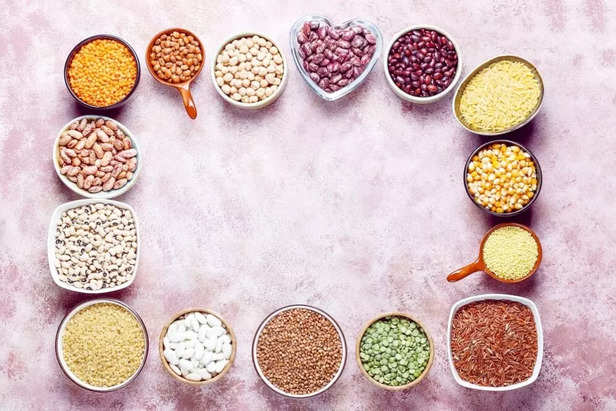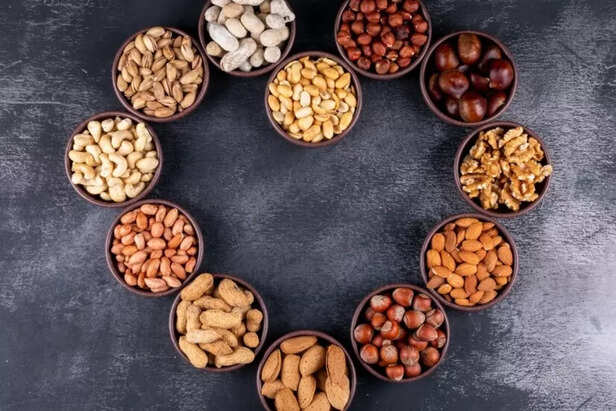You Won’t Believe How Much Protein These Foods Actually Have
Shumaila Siddiqui | Wed, 02 Apr 2025
This article explores the best protein foods for diet, highlighting diverse protein-rich foods for a healthy diet beyond meat and eggs. It includes legumes like lentils and chickpeas, whole grains like quinoa and oats, and vegetables such as spinach and broccoli. Dairy options like Greek yogurt and cottage cheese, along with nuts and seeds, also provide essential protein. The article emphasizes high-protein foods for weight loss, explaining their role in boosting metabolism and maintaining muscle mass.

Photo:
When considering protein-rich foods, common choices like chicken, beef, and eggs often come to mind. However, numerous lesser-known foods provide a substantial protein boost, making them valuable additions to a balanced diet. These foods not only help in muscle building and weight management but also add variety to daily meals, ensuring nutritional diversity.
Protein is a crucial macronutrient responsible for tissue repair, metabolic support, and prolonged satiety. A well-balanced diet that incorporates diverse protein sources contributes to overall health and well-being.

Legumes are widely recognized for their fiber content, but they also serve as excellent protein sources for health-conscious individuals.

Whole grains not only provide fiber and energy but also contribute a significant protein boost.
Vegetables: Surprising Protein Sources

Some vegetables provide a significant protein boost alongside their essential vitamins and minerals.
Dairy and Dairy Alternatives: More Than Calcium

Dairy products and their plant-based alternatives are excellent sources of protein, calcium, and probiotics.
Nuts and Seeds: Compact Protein Sources

Nuts and seeds provide protein along with healthy fats and fiber, making them ideal for snacks and meal enhancements.
High-Protein Foods for Weight Loss
Incorporating high-protein foods is crucial for weight loss while preserving muscle mass. Protein helps curb hunger, increases metabolism, and promotes fat loss. Foods like Greek yogurt, lentils, quinoa, and almonds are ideal for a weight-loss diet as they sustain energy levels and provide essential nutrients.
The Power of Protein in Your Diet
 Protein is more than just a nutrient; it is fundamental to maintaining a strong and healthy body. Whether the goal is muscle gain, weight loss, or general wellness, incorporating a variety of protein-rich foods ensures nutritional balance. From plant-based options like lentils, quinoa, and almonds to dairy products and lean meats, there are countless ways to meet daily protein needs while keeping meals flavorful and diverse.
Protein is more than just a nutrient; it is fundamental to maintaining a strong and healthy body. Whether the goal is muscle gain, weight loss, or general wellness, incorporating a variety of protein-rich foods ensures nutritional balance. From plant-based options like lentils, quinoa, and almonds to dairy products and lean meats, there are countless ways to meet daily protein needs while keeping meals flavorful and diverse.
Unlock insightful tips and inspiration on personal growth, productivity, and well-being. Stay motivated and updated with the latest at My Life XP.
Protein-Rich Foods for a Healthy Diet
Legumes: Beyond Just Fiber

Protein-Rich Legumes: A Healthy Boost for Every Meal
Legumes are widely recognized for their fiber content, but they also serve as excellent protein sources for health-conscious individuals.
- Green Peas: Typically used as a side dish, green peas provide approximately 8 grams of protein per cooked cup. They are also rich in vitamins A, C, and K, making them a nutritious addition to salads, soups, and stir-fries.
- Lentils: These versatile legumes contain around 18 grams of protein per cooked cup, nearly matching the protein content of three large eggs. Their high fiber content aids digestion and promotes satiety, making them a great addition to stews, salads, or as a meat alternative.
- Chickpeas: A staple in Mediterranean cuisine, chickpeas offer about 15 grams of protein per cooked cup. They can be enjoyed in hummus, salads, or as a roasted snack.
- Black Beans: With 15 grams of protein per cooked cup, black beans provide an excellent
plant-based protein source, suitable for burritos, soups, and salads. - Edamame: These young soybeans contain 17 grams of protein per cooked cup and provide a complete amino acid profile, making them one of the most effective plant-based protein sources.
Whole Grains: More Than Just Carbs

A Perfect Blend of Protein and Fiber
Whole grains not only provide fiber and energy but also contribute a significant protein boost.
- Quinoa: This nutrient-dense grain contains about 6.5 grams of protein per cooked cup and is a complete protein, offering all nine essential amino acids. It's also gluten-free, making it suitable for individuals with gluten sensitivities.
- Barley: Often recognized for its fiber content, barley also offers notable protein benefits. It can be used in soups, stews, or as a rice substitute.
- Oats: Commonly consumed as a breakfast staple, oats provide around 11 grams of protein per cooked cup. Their beta-glucan fiber content helps lower cholesterol and supports heart health.
- Farro: This ancient grain contains roughly 6 grams of protein per cooked cup and works well in salads, soups, and grain bowls.
- Brown Rice: With approximately 5 grams of protein per cooked cup, brown rice serves as a nutritious and filling carbohydrate source.
Vegetables: Surprising Protein Sources

Protein-Packed Vegetables
Some vegetables provide a significant protein boost alongside their essential vitamins and minerals.
- Brussels Sprouts: These small cabbages not only enhance protein intake but also supply fiber, vitamins C, and K.
- Spinach: With around 5 grams of protein per cooked cup, spinach is a top protein-rich vegetable. It is also an excellent source of iron, beneficial for preventing anemia.
- Broccoli: Containing nearly 4 grams of protein per cooked cup, broccoli is packed with antioxidants, fiber, and vitamin C, supporting immunity and overall health.
- Asparagus: Offering about 4.5 grams of protein per cooked cup, asparagus enhances both flavor and protein content in meals.
- Sweet Corn: This starchy vegetable provides approximately 5 grams of protein per cooked cup, making it a great addition to salads and bowls.
Dairy and Dairy Alternatives: More Than Calcium

Dairy & Plant-Based Alternatives
Dairy products and their plant-based alternatives are excellent sources of protein, calcium, and probiotics.
- Greek Yogurt: A 6-ounce serving of Greek yogurt contains up to 15 grams of protein, nearly double that of regular yogurt. It also supports digestion and bone health.
- Cottage Cheese: Offering about 14 grams of protein per half-cup, cottage cheese pairs well with fruits, nuts, and seeds for a high-protein snack.
- Tofu: A staple in vegetarian diets, tofu provides up to 10 grams of protein per half-cup. It is highly versatile, absorbing flavors well in stir-fries and other dishes.
- Almond Milk: While not as protein-rich as dairy milk, fortified almond milk offers a slight protein boost along with vitamin E and healthy fats.
- Cheese: Varieties such as Parmesan and cheddar contain up to 10 grams of protein per ounce, making them a great addition to various meals.
Nuts and Seeds: Compact Protein Sources

Small in Size, Big in Protein
Nuts and seeds provide protein along with healthy fats and fiber, making them ideal for snacks and meal enhancements.
- Almonds: These nutrient-dense nuts offer approximately 6 grams of protein per ounce, along with vitamin E and heart-healthy fats.
- Chia Seeds: A small serving of two tablespoons contains around 4 grams of protein, in addition to omega-3 fatty acids and fiber.
- Pumpkin Seeds: With 7 grams of protein per ounce, pumpkin seeds are one of the most protein-rich plant-based options.
- Sunflower Seeds: Providing about 6 grams of protein per ounce, sunflower seeds are a great addition to salads and snacks.
- Peanut Butter: Two tablespoons deliver around 8 grams of protein, making it a tasty and nutritious meal component.
High-Protein Foods for Weight Loss
The Power of Protein in Your Diet

Protein: The Key to Strength, Energy, and Wellness_
Unlock insightful tips and inspiration on personal growth, productivity, and well-being. Stay motivated and updated with the latest at My Life XP.
Frequently Asked Question (FAQs)
- What are the best high-protein foods to eat?
Lean meats, eggs, Greek yogurt, lentils, quinoa, and almonds are excellent high-protein options. - Which food contains the highest protein?
Animal sources like chicken breast and fish have the highest protein, while plant-based options like lentils and edamame offer substantial amounts. - What foods add protein to the diet?
Foods like eggs, cottage cheese, tofu, nuts, seeds, and whole grains help boost daily protein intake.










